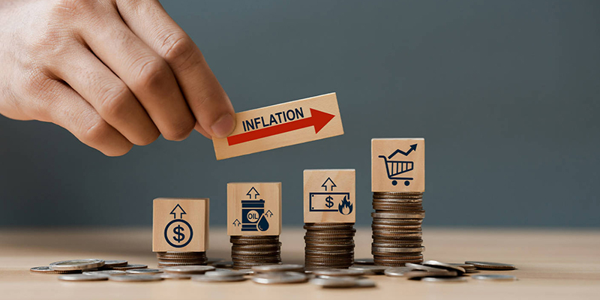People find it difficult to save money, but how about watching that hard-earned cash depreciate? There has been a gradual rise in inflation, reducing the value of your money. It is not just a question of numbers on the screen but of future security being thrown away.
Think of your retirement money, the money saved for your kid's college fees, that long-planned holiday is gone. It is a shame that this is all we can do, but you realize we're not powerless.

Keep reading this blog post to learn more about measures to protect your money from the inflation monster. These strategies do not require a finance degree; you can implement them now.
Are you feeling up to take the fight against inflation? Let's get started!
Do you know that feeling of your money not going as far as it used to? That's inflation in action. Inflation is a hidden cost extracted from your cash and determines how much you can spend.
The thing is, even while expenses are increasing, your profits still need to. That $100 bill you have been keeping in that drawer? It'll purchase less next year than it does today. It is not Monopoly money, but it sometimes feels that way when dealing with a considerable amount of money.
Well, imagine your grandparents discussing the five-cent sodas. That's inflation's hard work over the decades. Just think what it would do to your 401 (k) or your children's college education fund.
Neglecting inflation is similar to preparing for a trip without first checking the fuel gauge. If one needs to be wiser to handle the situation, they can begin well but end up in a fix.
Let's get to the critical part now that we have that out of the way. Here is your financial arsenal to shield your money from inflation.
Have you ever heard the saying, do not put your eggs in one basket? That's what diversification is, in a nutshell. It is like financial juggling, where one has to balance many financial balls simultaneously.
Companies, governments, houses, and perhaps a few bars of gold are all on the list of tasty securities. Stocks can be considered to grow at a high rate, as a cat grows on caffeine. Bonds are more stable, like your old dog; you know they will not disappoint you.
Some propose the following distribution:
● 50% in stocks for growth
● 30% in bonds for stability
● 15% in real estate for income
● 5% in commodities for inflation
Remember that each person's ideal recipe is unique and depends on their ability to take risks and their stage of life.
Treasury inflation-protected securities are referred to as TIPS. They resemble bonds but with a boost for inflation.
Here's how they work: This causes your principal to increase as inflation increases. It is like having an umbrella to wear when it is financially rainy, especially when the rain is inflationary. The government ensures it and pegs it as secure as any investment.
However, one should expect this to take time for him to become a millionaire. TIPS are not instruments for making money but for protecting it. They are the tortoises of the investment race, slow and consistent.
Tangible assets are the macho men of the investment universe. Items such as land, gold, or oil are considered assets. Inflation can be regarded as an aggressive striker; these assets land the punches in response.
We have found that real estate investment can be among the best inflation fighters. In this situation, prices increase, and so does property value. Also, you can raise the rent charges to match the inflation rates if you are a landlord.
Assets such as gold have been used as inflation hedges since the earliest recorded history of humanity. However, they are that financial comfort food that consumers turn to when the economy starts getting sick.
These investments imply growth, such as planting acorns rather than purchasing oak furniture. You are investing based on future possibilities rather than on current worth.
It might sound like technology companies, newly started businesses, or companies in new economies. These can grow at a higher rate than inflation. However, remember that the higher potential generally implies a higher risk.

Investing in growth and value stocks can offer the best of both worlds, meaning your investment will be secure. You know what it feels like to drive a speed boat while at the same time owning a cruise ship in your investment portfolio.
An emergency fund is your financial cushion or your car's airbag for money. It may not make you a millionaire, but it can improve your finances.
You should now have 3-6 months of living expenses in an emergency fund or a high-yield savings account. It will not outcompete inflation, but that is beside the point. It protects you when you fail, not to help you win a race.
It is a way of paying for the security of mind. When life hits you with a punch (and it will), you'll be prepared not to sell investments at a loss and not charge to the limit.
Do not let inflation sit in the backseat of your financial life as the driver. Now is the time to take the wheel and navigate your savings to a safer destination.
If this is the only way to manage it, begin with small portions. You can deposit the money into a high-interest-bearing account this week or speak to a financial planner next month. The important thing is to begin.
The numbers on the screen are not the real issue at stake. It's about you, what you want to do in life, how you want to be protected, and how you want your future to be. This means that every step you take today is a blessing in the future.
So, what is your first strategic move? Whatever it is, complete it today. Your pocket will also be lighter.
Q. What's the best way to protect my savings from inflation?
Ans: There is no general solution, but the strategy is clear: diversify. Diversify your money by investing in stocks, bonds, and tangible assets like gold. It is like investing only some of your cash in one business or stock.
Q. How much should I keep in my emergency fund?
Ans: Your living expenses should be between three and six months. It's not about outcompeting inflation, but it is about having money saved up. Please put it in a high-yield savings account so it is easily accessible.
Q. Can inflation-protected securities lose value?
Ans: Yes, they can. However, if interest rates rise faster than inflation, TIPS can decline in value. They also depend on the market price. However, they are still considered less risky for maintaining purchasing power over time.